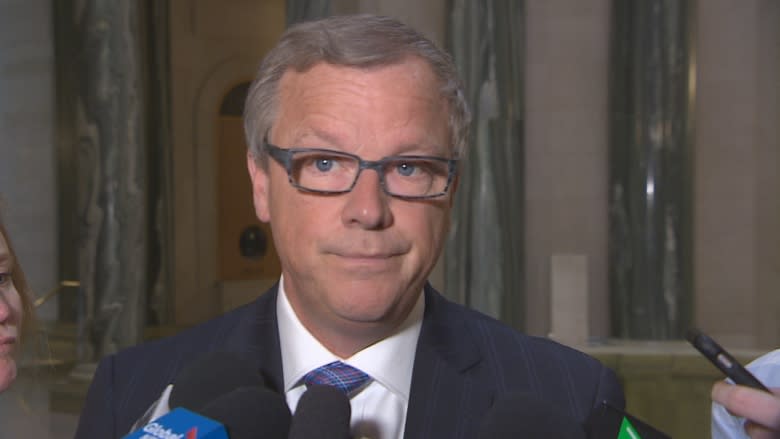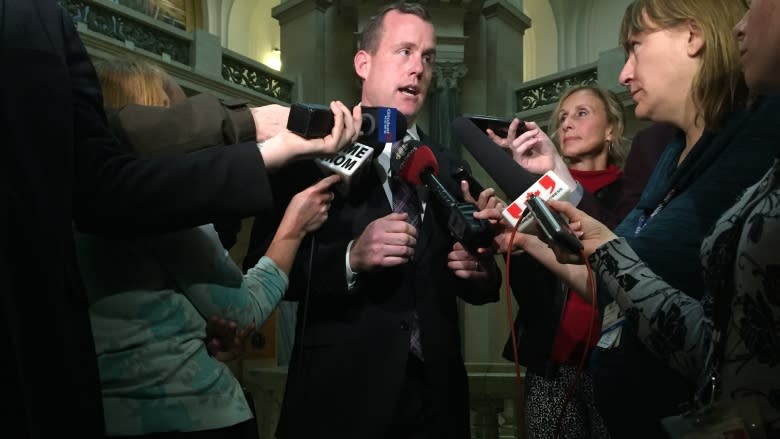Sask. premier wants to cut overall public sector worker compensation by 3.5%
Saskatchewan Premier Brad Wall has set a target to cut overall public sector worker compensation by 3.5 per cent.
Wall said the cuts will hopefully save $250 million, a necessary part of paying off a looming $1.2-billion deficit.
The government wants everyone from teachers to nurses to be subject to the cuts.
Speaking specifically about nurses, Wall said the proposed cuts would not "necessarily do anything to the total number" of people working in specific roles.
Meanwhile, all MLAs will take a 3.5 per cent pay cut, and all ministerial and political staff will take nine unpaid days off a year.
"I'm not asking anyone to consider anything that I'm not prepared to do," said Wall. "It's important that we get ahead of expenditures."
Wall said that he would respect the collective bargaining process, and any changes would need to be negotiated through unions.
"We want to leave it to the bargaining tables, but we're serious," said Wall.
Whether or not the proposed pay cuts should continue after the first year is a decision that would be made through collective bargaining, he added.
Decision could lie with union members
Saskatchewan Federation of Labour president Larry Hubich said the decision on whether to adopt the cuts would ultimately lie with union members.
"Even if the union was interested in negotiating that with the employer to save money, if that was a possibility or if they assumed some responsibility, they can't actually agree to something like that without taking it to the members," said Hubich.
He said putting an overall target on reducing compensation interferes with the collective bargaining process.
"It obviously [makes] a difficult situation even more difficult, when government has mandated that employers must try to extract a three-and-a-half per cent cut," said Hubich.
"It's really unfair to the workers who didn't create the mess in the first place."
Hubich suggested the government could instead cut costs by renegotiating its contract for building the $1.9-billion Regina bypass project, or asking for concessions on private sector contracts for projects like hospitals and schools being built under public-private partnerships.
'Wall's Weekends' among measures considered
Wall said the 3.5 per cent target will be acknowledged in the government's upcoming budget, which will be tabled on March 22.
Wall would not say what the government planned to do if unions refused to meet the target.
The government would also be looking at inefficiencies in overtime processes and overtime rates, said Wall, adding that those rates currently exceed what is required under labour laws.
It is also considering mandatory unpaid leave for public sector employees as a cost-saving measure.
That plan, which has already received its fair share of nicknames — titles like "Wall's Weekends" and "Brad's Breaks" — has been compared to similar plans in other provinces.
In 1993, then-Ontario Premier Bob Rae enacted what came to be called "Rae Days," which required public sector employees making more than $30,000 annually to take 12 unpaid days off per year.
In the same year, Manitoba introduced what were later coined "Filmon Fridays," named after then-premier Gary Filmon.
On Monday, Wall announced he would no longer accept a salary top-up from his party that amounted to about $40,000 per year.
Cabinet members should take bigger cut: NDP
The Opposition said it had no problem with its MLAs taking a pay cut, but public employees should not have to pay for the government's financial mismanagement.
"A base cut of 3.5 [per cent] to MLAs: we'll accept that," said Opposition leader Trent Wotherspoon.
But the NDP will also push for a 20 per cent cut to cabinet members' additional allowances, he said.
Opposition wants fewer MLAs
Wotherspoon also wants to see cuts to the number of MLAs in the legislative assembly, saying it should be reduced by at least five. The Saskatchewan Partyadded three new MLAs in 2012, bringing the total number to 61.
"Those three new MLAs that have been added, there's dollars that are directly flowing to support their offices, their staff and their pay," he said.
"Those are three MLAs that weren't needed."
The government said it had already offset the cost of the new members through cuts to MLA allowances, service expenses and capital provisions for offices, such as money for buying furniture and computers.



